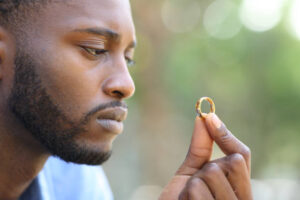HAITI
Marlene Daut’s deep dive into Haiti’s first — and only — king reads like a historical novel of a bygone era with Black princes and knights, an elaborate dress code and a palace, Sans-Souci, to match. But Daut’s “The First and Last King of Haiti: The Rise and Fall of Henry Christophe,” isn’t a novel— even if at times its fascinating prose about the self-proclaimed king and veteran of the Haitian Revolution and the betrayal and geopolitical clashes that shaped his 13-year reign over the Kingdom of Haiti at times seems like fiction. While Christophe ruled in the north, Alexandre Sabès Pétion, another hero of the revolution and later his rival, governed in the south as president of the Republic of Haiti.
“There’s not a lot of attention paid necessarily to this period,” Daut said. “Of course, there should be tons and tons of studies of the Haitian Revolution, but I think that we also need to study and pay more attention to the lives of the people who lived during the revolution, outside of Toussaint.” Toussaint is Toussaint Louverture, the former slave-turned-general who is widely regarded as the father of the Haitian Revolution, the only successful slave revolt leading to the founding of a Black nation and the abolition of slavery. But while Toussaint is traditionally depicted in literature as a hero, historians and artists have tended to portray Christophe as an “irredeemable monster.”
That, said Daut, a renown expert on Haiti’s history and revolution who will be giving a public lecture at 5 p.m. Thursday at the Richter Library at the University of Miami, is what drove her to finally tackle a biography on the king. “I was fascinated by the fact that the Christophe portrayals lasted for so long into the 20th Century, into the middle of the 20th Century, in comic books, and yet there still is not like a big Hollywood movie,” said Daut, a professor of French and African Diaspora Studies at Yale University. “I just really wanted to find out more about his life.”
Born in Grenada to an enslaved mother and fluent in English, Christophe is perhaps best known as the architect of the famous Citadelle Henry, the mountaintop fortress completed in 1813 to guard against another French occupation. Located on the outskirts of Cap-Haïtien in the city of Milot, it stands today as a UNESCO World Heritage site, along with the remnants of his Sans-Souci Palace, largely destroyed in an 1842 earthquake. He is also known as the controversial and brash leader who despised idleness and, after creating a monarchy in Haiti in 1811, eventually suffered a tragic end. In 1820, after a stroke and with his enemies close, Christophe took a gun and shot himself in the heart, ending a 13-year reign during which he had built a prosperous Black kingdom after defeating what at the time was the world’s most powerful army.
In between those bookends, however, much about Christophe’s life and contributions have been debated, exaggerated and even misrepresented against a backdrop of an isolated Haiti. He remains, Daut writes, “as misunderstood now as in the past,” despite having been one of the most written about revolutionary figures in literature.
Daut’s fourth book
This is Daut’s fourth book, one she acknowledges she could not have written 15 years ago when her interest in Christophe first arose as she was researching her dissertation about the literary portrayals of Haiti’s revolution. “I wouldn’t have known who exactly to look for if I had started out at the beginning to write this, because I also had to know the history of the Revolution. Because in the book, I have to tell the history of the Revolution,” Daut said. “I try to do it through his eyes and experiences. But I had to, know what battle happened here, and so that way, when I’m reading a letter, I know what context to put it in.”
When she finally decided to write the book 10 years ago, Daut said, she “had to think about things differently from the way that I thought. “I thought, ‘Oh, I’m going to just go into archives and find all the information,’ ” she said said earlier this year during a visit to Miami, where she presented the book at a reading sponsored by The Prologue Society at Temple Israel of Greater Miami. “Then I realized that what I needed to think of as an archive, wasn’t just like over in France or England or in New York, but the stuff that was from Haiti and that was scattered all over the place.”
These included newspapers from the northern kingdom, and royal almanacs that the king had kept. She also used the writings of Christophe’s loyal secretary and the subject of one of her previous books, Baron de Vastey, along with documents and scholarly works. All are used one way or another in the book to debunk lies and fictionalized misrepresentations, or to set the record straight.
Among the revelations: Christophe was born is 1767 and not 1758 as often cited, and he was from Grenada, not St. Christopher, now St. Kitts. Another is his role in the fight for U.S. independence as a member of the regiment of free men of color, the Chasseurs-Volontaires de Saint-Domingue, that fought alongside American and French troops in the Battle of Savannah in 1779. (In 2007, the Haitian American Historical Society in Miami built a monument in Savannah recognizing the regiment’s contributions and featured a young Christophe as a drummer boy; a street in north Miami Dade County is also named after him using his French spelling, Roi Henri Christophe Boulevard). “We know that he fought at the Battle of Savannah because one of his most important ministers wrote it in a book that he published on behalf of Christophe while Christophe was alive,” Daut said about the often debated topic. “So that has to have more weight than something someone else would say… It was put in the official record by his own historian.”
Scattered documentation
Daut’s 630 pages is as much a story about Christophe as it is about Haiti’s history and how its archives are scattered everywhere. To frame the history of Christophe she traveled to Italy, where his widow and children are buried in a church, and made visits to England, France and the New York Public Library. She also relied on friends and colleagues to access papers, some of which are in private hands. “It’s kind of a sad fact that a lot of the documentation from this period is in other countries,” Daut said. “That is in large part because foreigners were in the country at the time, and they took materials home with them that Christophe gave to them. Some of the stuff, like ‘The Armorial of Haiti,’ is in England because the British, when he committed suicide, took it.” The Armorial Général du Royaume d’Hayti is a guidebook to the symbols of nobility during Christophe’s reign.
Christophe was a complicated figure. He was feared by world powers, but also revered and reviled by his own subjects. He championed a national education system and created a legal code. But he also pushed eyebrow-raising policies. “The one I always cite is this idle policy; nobody can be idle. Everyone has to contribute to the state,” Daut said.
One thing he was not, Daut says, was a sellout. Like revolutionary hero Jean-Jacques Dessalines, who on Jan. 1, 1804, declared Haiti free from French rule, “Christophe didn’t sell out the people to foreign powers,” and he did not give into France’s threats. The French would later demand an indemnity of 150 million francs, reduced to 90 million, to compensate for the loss of property, an amount equivalent to about $21 billion today. “Even if they were imperfect rulers, autocratic rulers, authoritarian rulers,” Daut said, Christophe and others stood up to France and turned down its demands. The one who did finally cave in was President Jean-Pierre Boyer, who after Christophe’s death united the south and north, and agreed to France’s demand for payment.
“I always come back to the indemnity,” said Daut, whose mother was born in Haiti. “I know that it seems like such an abstraction to think about — what’s the relationship of the indemnity to now. But when you think about the cost of the indemnity itself, the opportunities lost, then you have to have a different perspective on it, and also the way that the world treated Haiti in the 19th century, trying to isolate the country, trying to punish various Haitian leaders, to push them into a position of dependency. We can clearly see that it didn’t have to be that way, it was orchestrated.” Daut says she wants readers, especially Haitians, to understand the period around Christophe’s reign and all of its complexity.
“It’s about the king, but it’s also about the kingdom,” she said, adding that Haiti is more than its cycle of crises. “It is a place with a nuanced history.” If you want to go: Stanford Lecture with Professor Marlene Daut, “Henry Christophe: King in a World of Kings,” will take place at 5 p.m. Thursday at the Richter Library at the University of Miami, 1300 Memorial Dr., Coral Gables. The event is free but registration is required at https://events.miami.edu/event/stanford-lecture-with-professor-marlene-daut-henry-christophe-king-in-a-world-of-kings
Read more at: https://www.miamiherald.com/news/nation-world/world/americas/haiti/article302338774.html





















